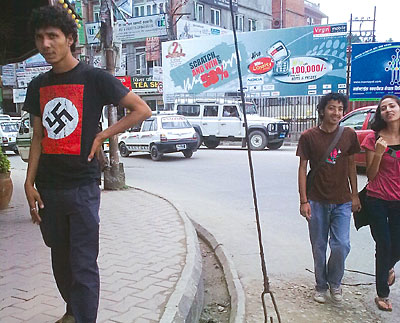 RABI THAPA |
A crop of neo-Nazis is gaining ground in Mongolia, The Guardian recently reported. They might be the exact opposite of the Third Reich's Aryan ideal, but the ultra-nationalists there want to fight the influence of Chinese in their homeland, and they want Adolf Hitler to show them how.
In India, Hitler's Mein Kampf has been a bestseller for more than a decade, giving steady business to roadside hawkers, bookshops big and small, and online stores. His fans are found in the most unlikely of places � the prestigious Indian Institute of Technology, for example, whose management students say they "admire his leadership qualities".
But we need not go so far to meet the crazies. A book fair in Kathmandu carried a Nepali translation of Mein Kampf last week with a translator's note that read: "Hitler had a bad and a good side. This translation focuses on his good side with the hope it will be instructive to young people in Nepal today to learn about nationalism."
In a discussion titled "Nepal is in need of a leader like Hitler!!" on Facebook, someone has commented: "It's Nepal's misfortune that a Hitler has not been born in Nepal."
Fringe thinking is not and should not be a cause for alarm but idol worship guided by sheer ignorance should be worrying. In the process of turning Narayanhiti Palace into a museum, a senior bureaucrat spoke proudly of a Mercedes Benz apparently presented to the then king of Nepal by the Nazi leader. "The car will be a major attraction there," he said. When it turned out that the vintage car was actually in India with one of the descendants of Juddha Shamsher, the Indian media sounded almost jubilant: "Hitler's car in India, not in Nepal's palace".
In Nepal, idol worship is a standard political affair with Maoist leaders posing next to Joseph Stalin in official portraits. But don't blame their version of communism and somewhat easier relationship with violence for the worship of a man responsible for the 'liquidation' of 15 million people; the centrist CPN-UML had to hide a picture of Stalin hanging in their offices when former US ambassador James Moriarty dropped in for a visit a year ago.
What seems to be lost in attempts to channel these strong leaders, and among young people donning t-shirts with Nazi swastikas in Jawalakhel, is the understanding of basic historic facts. Over six million Jews, homosexuals, and disabled people were gassed in Germany under the strong leadership and efficient management of Hitler. Nearly 700,000 were executed during Stalin's Great Purge, that too by conservative accounts. His policy of forced collectivisation was responsible for the death of 15 million peasants. We can argue they were strong leaders but what of their brutality?
Without a doubt, there is a yearning for a great leader here in Nepal, just as in Germany following the crushing humiliation of the First World War and its aftermath. We want a leader to show us the way forward, and to deliver unto us the rewards of freedom that we were promised. It's also clear the Maoists and others, in seeking to align themselves with the 'great' leaders of the past, mean to present themselves as great leaders whose time has come.
The question for Nepal is whether nationalism is even a workable idea if the goal is prosperity for the country and security for its people. Already four million Nepalis work outside Nepal. Remittances are the biggest and fastest growing source of national income. Individuals are pursuing their own goals. Never mind international boundaries, Nepal isn't really one nation. Just ask the minorities.
Great nations need great leaders. The best leaders aren't those who emulate past figures, they are those who take inspiration from their surroundings and the people they seek to serve, and those who understand the context of the changes taking place around them. Hitler may have run a tight ship back in the day, but if we follow him blindly, we will end up looking like the Mongolian neo-Nazis � just plain stupid.
READ ALSO:
The winner can't take all, PUBLISHER'S NOTE
Twin crises, PRASHANT JHA
The urban bias, CK LAL



